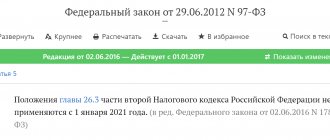Why was movable property taxed?
Is it true that the movable property tax is returning from 2021? Let's explain what's going on. Legal regulation of the tax on movable property of organizations from 2021 is carried out, as before, by Chapter 30 of the Tax Code of the Russian Federation. However, the main powers on this issue are given to regional authorities.
As you understand, the movable property tax has not been abolished since 2018. Although the Russian Ministry of Economic Development was very actively in favor of this. In general, there were great debates on this issue.
Initially, the Russian Ministry of Economic Development proposed to exempt all movable property of enterprises from tax and extend this rule to legal relations arising from 01/01/2018.
The Cabinet of Ministers wanted to maintain this benefit at the federal level only until 2021, but many constituent entities of the Russian Federation were against it. They expressed a desire to exercise their right not to introduce benefits on their territory, in order to thereby increase the collection of property tax, since it is of a regional nature.
As a result, all parties to this discussion agreed on an option that suited everyone. The new tax on movable property from 2021 allows for the introduction of amendments to the Tax Code of the Russian Federation, introduced by:
- Law of November 30, 2021 No. 401-FZ;
- Law of November 27, 2021 No. 335-FZ.
Until 2021, legal entities did not pay tax on movable property that was registered in 2013. An exception is movable assets from interdependent counterparties during liquidation or reorganization.
Taxi House
The meeting of the Moscow Mayor with representatives of taxi and car sharing companies, as well as aggregators, took place at the Taxi House (Architect Vlasov Street, building 55). It opened in October 2017 based on the office. This is a professional club for taxi drivers, where they can relax, chat with colleagues, get advice or get a job.
In the lobby of the Taxi House you can watch videos, play chess and table football. You can warm up lunch or dinner in the kitchen corner, and undergo a pre-trip examination in the medical office. There is also a lecture hall, rooms for negotiations and legal consultations.
Call center employees help taxi drivers get a job, answer questions about current orders, and assist in resolving disputes.
Every day, the Taxi House is visited by up to 150 driver employees.
Taxi houses are planned to open in other districts of Moscow.
Conditions for paying tax on movable assets
The all-Russian movable property tax benefit has been liquidated since 2018. The new procedure for the functioning of the benefit is as follows: if a region of Russia did not adopt a law introducing a benefit on movable property in 2021, then from 2021 it will not exist (Article 381.1 of the Tax Code of the Russian Federation). It must be said that the regions don’t really want to introduce it anyway.
So, in Moscow there will definitely be a tax on movable property from 2021. As in most regions of Russia.
Let us remind you that by virtue of subclause 8 of clause 4 of Art. 374 of the Tax Code of the Russian Federation, from January 1, 2021, only fixed assets from III and subsequent depreciation groups (i.e., with a useful life period of 3 years) are subject to the tax on movable property.
As a general rule, movable assets are everything that is not real estate (Article 130 of the Civil Code of the Russian Federation).
In the Russian region, property tax on movable assets will have to be paid starting from 2021, unless the corresponding law of this territory introducing a benefit has been adopted.
What are the objects of taxation?
Dear readers! The article talks about typical ways to resolve legal issues, but each case is individual. If you want to find out how to solve your particular problem , contact a consultant:
8 (800) 700 95 53
APPLICATIONS AND CALLS ARE ACCEPTED 24/7 and 7 days a week.
It's fast and FREE !
Two types of taxes can be charged for cars: transport and property, when considering the car as movable property.
Transport tax is required to be paid for citizens living in the Russian Federation, regardless of the region where the transport is registered. This is regulated by Article 357. Tax Code of the Russian Federation. The same rule applies to organizations whose fixed assets include vehicles.
Companies must independently calculate the amount of tax and advance payments for it. Federal Tax Service employees do this for individuals, based on information from state registration services.
Transport tax is calculated based on the results of the tax period. The tax amount will be affected by the rate, tax base and the number of cars owned by the person.
Transport tax is subject to:
- automobile;
- motorbike;
- bus;
- self-propelled tracked vehicles;
- boats, sailboats, speedboats, helicopters, snowmobiles, airplanes and water or air transport.
Tax may not be paid for the following types of transport:
- Motor or rowing boat, the engine power of which does not exceed 5 hp.
- Passenger cars intended for disabled people and purchased with social security funds, the engine power of which does not exceed 100 hp.
- Fishing sea and river vessels designed to transport people or goods by water and owned by organizations or businessmen.
- Equipment intended for agricultural work, provided that it is owned by peasants or farms.
- A vehicle owned by authorities or various government departments.
- Aviation equipment designed to provide medical services in remote areas of the country.
- Vessels that are registered in the international registry.
The above categories of vehicles are exempt from paying tax in accordance with Article 358 of the Tax Code of the Russian Federation.
Under property tax movable assets we mean cars, production equipment, furniture, money, computers and other taxable objects that do not fall under the category of real estate.
Payers
Property tax is levied on movable and immovable assets:
- in use, temporary possession, permanent use, trust management;
- used for joint activities;
- received after concluding a concession agreement;
- listed in the possession of an individual or on the balance sheet of fixed assets of an enterprise.
A detailed list of taxable objects can be found in Art. 401 of the Tax Code of the Russian Federation.
At what rate should the tax be calculated?
The new paragraph 3.3 of Article 380 of the Tax Code of the Russian Federation makes an important clarification regarding the calculation of tax on movable property from 2021. Thus, its rate in 2021 cannot exceed 1.1%.
Thus, if a subject of the Russian Federation has not adopted its law on benefits, then the tax must be paid at a rate of 1.1%
Moscow standard taxi
The revival of taxis - accessible, inexpensive and safe - is one of the key areas of modernization of the capital's transport system.
Over the past seven years, a Moscow standard for taxi transportation has been created. It includes the use of yellow cars with yellow license plates. Taxis have the right to travel in dedicated lanes for public transport.
You can order a car using mobile aggregators and other applications. In addition, the standard provides for affordable prices and short delivery times, as well as the simplicity and accessibility of starting your own business in the field of taxi transportation.
A convenient procedure for issuing permits for taxi operations was introduced in 2011. From July 1, 2013, permits can only be obtained for cars with a yellow body color.
Thus, from July 1, 2021, all 100 percent of taxis with permits issued in Moscow will be yellow.
Since November 14, 2013, the registration of yellow license plates has been simplified. You can obtain them upon initial contact with the traffic police.
Since April 1, 2014, the procedure for issuing permits has been completely transferred to electronic form - through the official portal of the Mayor and the Moscow Government mos.ru.
Now in Moscow there are 46.8 thousand permits for taxi operations, 90 percent of taxi cars are yellow. According to forecasts from the Department of Transport, 15.5 thousand new taxis will hit the city streets in 2021. The number of valid permits (taking into account the departure of some carriers from the market) will increase to 55 thousand.
In addition, according to the Department of Transport, there are from 15 to 20 thousand taxi drivers in Moscow who have received permission in the Moscow region.
Every day, Moscow taxis carry over 760 thousand passengers (about 280 million people a year).
The average cost of a taxi trip is 460 rubles (average time - 20 minutes, average distance - 10.6 kilometers).
The average time for a taxi to arrive on a working day is five to seven minutes. This indicator is one of the best in the world.
Taxi business in Moscow is carried out by more than one thousand legal entities and over four thousand individual entrepreneurs. The industry employs more than 100 thousand people.
The Moscow government supports companies that purchase cars on credit or lease. Since 2012, 156 organizations have received subsidies totaling over 500 million rubles. In total, 19.4 thousand taxi cars were purchased under the subsidy program.
For comfortable boarding and disembarking of passengers in the capital, there are 419 taxi stands with 1,453 parking spaces, including 180 parking lots with 640 parking spaces in the paid parking zone. There are automated taxi lines at railway stations.
During 2021, it is planned to organize another 40 taxi stands with more than 100 parking spaces, including in the Central District of the capital (near the Ulitsa 1905 Goda metro station, Luzhkov Bridge, business station, near the Quartet I theater on Lesnaya Street, Russian Chemical-Technological University named after D.N. Mendeleev), in the North-Eastern District (at the Jewish Museum and Tolerance Center, at the entrance to the Ostankino museum-estate, VDNH and in other places popular with citizens and guests of the capital).
Car sharing is a new type of public transport
The car sharing system (short-term car rental) began to actively develop in Moscow in 2015. Now it is a full-fledged form of public transport in the capital and a real alternative to a personal car.
There are 13 companies operating carsharing operators in the city (YouDrive, Delimobil, Anytime, Car5, BelkaCar and others). In February 2018, the 14th company is expected to enter the market.
Compared to October 2015, the car sharing fleet has grown 59 times and today amounts to 5.9 thousand cars. According to forecasts from service operators, in 2021 the fleet may grow several times more and reach 10–15 thousand cars.
The areas for using the service and the start and end of rentals are gradually expanding. Some operators are available in the cities of the Moscow region: Reutov, Dolgoprudny, Mytishchi, Khimki.
More than one million people are already registered in the carsharing system.
About 25 thousand trips are made daily. In 2021, carsharing cars were rented 5.6 million times.
The average cost per minute for renting a car sharing car is eight rubles, minutes in standby mode is three rubles (average travel time is 60 minutes). On average, one car sharing vehicle makes six trips daily.
Investments of operator companies in the development of the car sharing system in Moscow exceeded 1.5 billion rubles.
Car sharing vehicles that meet the requirements of the Moscow Government are given preferential rights to use city paid parking lots. Parking a short-term rental car for a car sharing operator is cheaper than paid parking in the city by an average of 85 percent. It is free for the user (or driver).
A preferential permit is issued for one vehicle for a period of three years (the permit is renewed every year, the issuance procedure now takes up to 10 working days, the service is planned to be converted into electronic form).
To obtain a preferential permit, the company (service operator) must meet a number of requirements: provide services 24 hours, seven times a week, have a 24-hour call center and software to provide remote access to the car. There are also a number of requirements for service vehicles. The body parts must be painted orange, and the cars must bear the logo of the Moscow Car Sharing project. In addition, you must have an MTPL policy, GPS/GLONASS equipment, and the environmental class of the engines must be at least Euro-4. Requirements for maximum vehicle dimensions have also been established. The period from the date of manufacture of the vehicle to the time of filing an application for a preferential permit must not exceed one year.
On August 8, 2021, the resolution of the Moscow Government “On urban support for taxi transportation in the city of Moscow” changed. This gave car sharing operators the opportunity to receive subsidies to reimburse part of the costs of paying lease payments under financial lease agreements for passenger cars.
For the 2021 FIFA World Cup in Moscow, participants in the Moscow Car Sharing project plan to adapt the service for foreigners: improve the application interface and simplify registration.
Additional measures to support and expand the use of carsharing are being considered. Thus, short-term rental cars may be allowed to be parked free of charge in city paid parking lots with barriers. Key condition: closed parking lots should not be used for long-term parking of carsharing vehicles.
Sergei Sobyanin approved the idea of using large heel-type vehicles in the car sharing system: Fiat Doblo, Renault Kangoo, Peugeot Partner, Citroën Berlingo and others. This will allow you to use the service for shopping trips to megamalls, out of town, and for transporting personal belongings. “We’ll do this as an experiment,” said the Moscow Mayor. According to him, the main thing is to try to maintain a balance and not interfere with taxis and classic car sharing.






